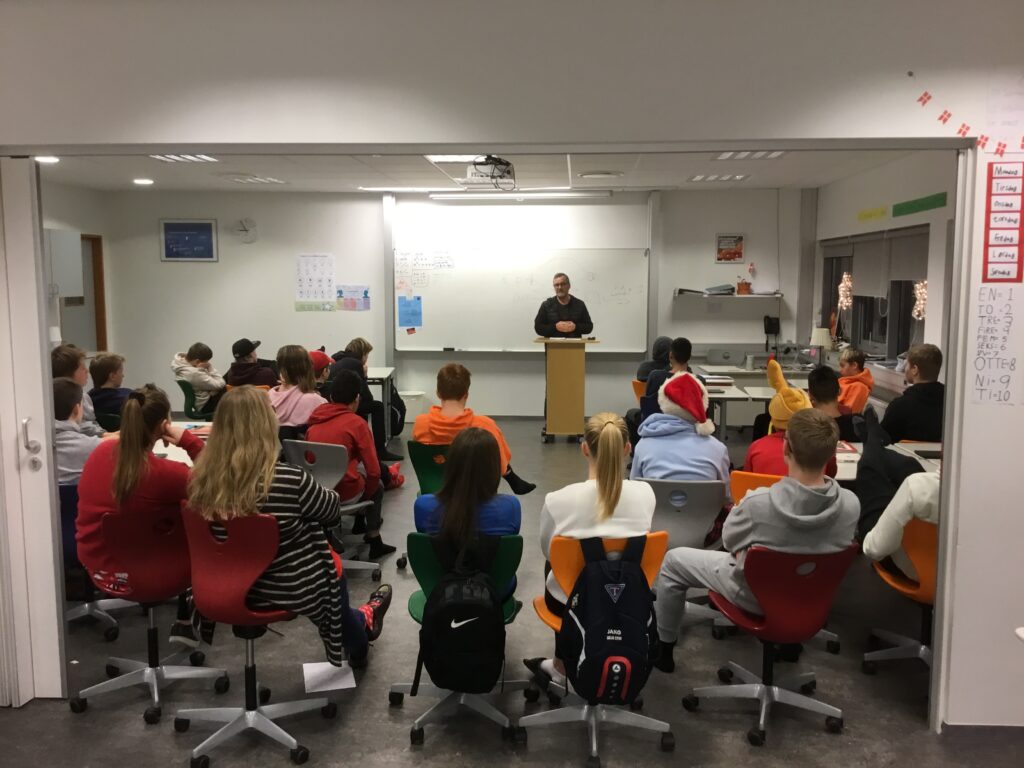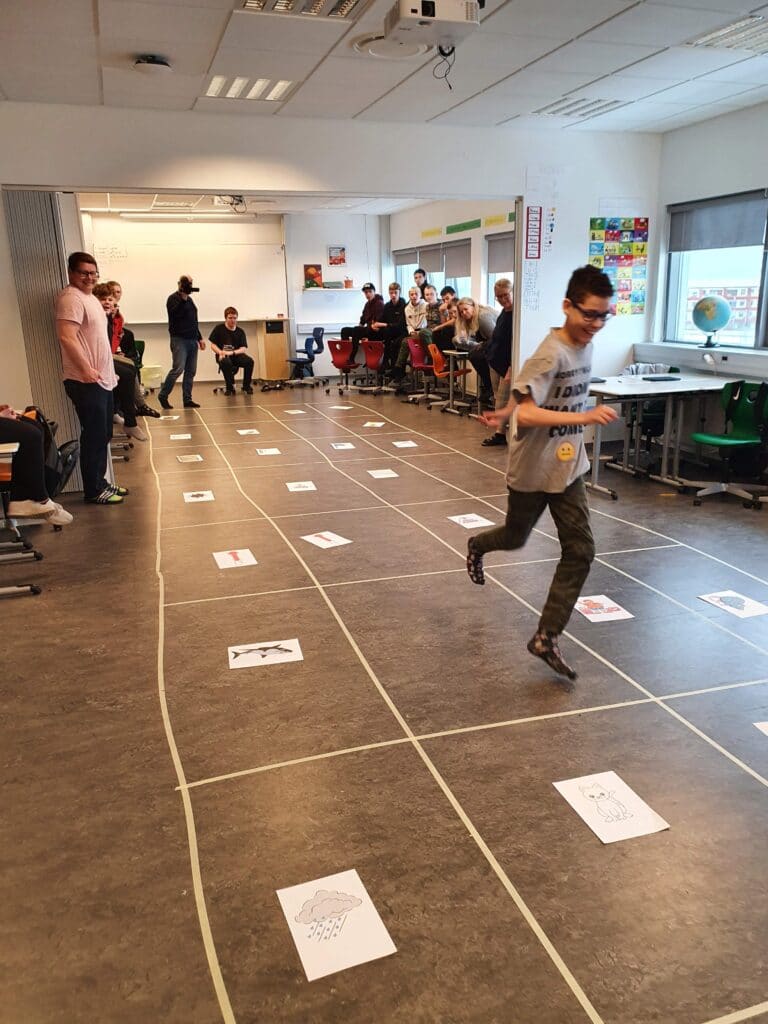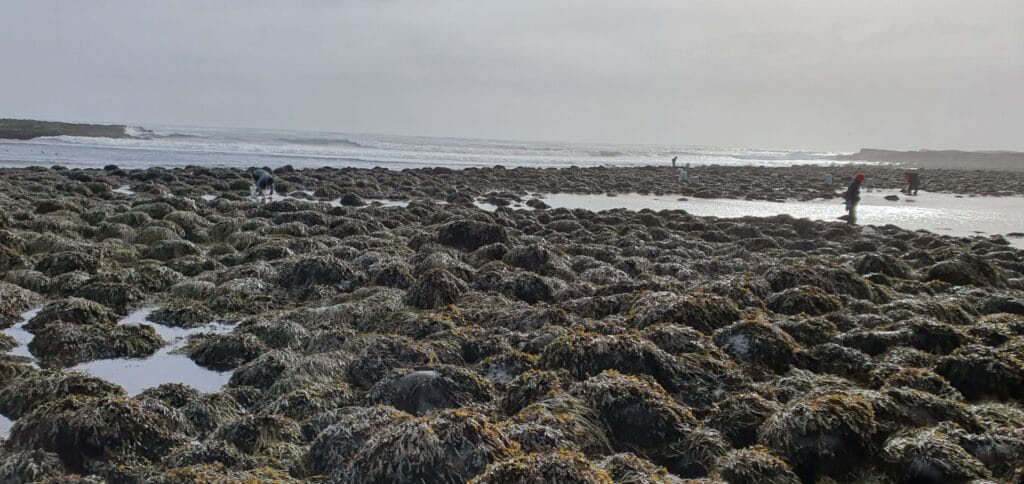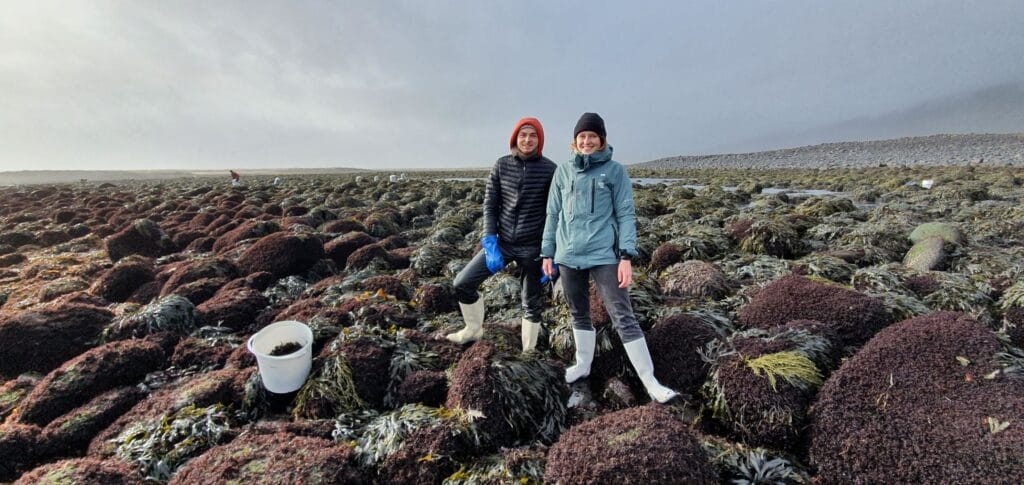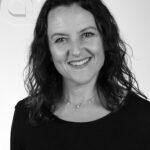Although the metabolism of phytochelatins and higher polyamines are linked with each other, the direct relationship between them under heavy metal stress has not yet been clarified. Two approaches were used to reveal the influence of polyamine content on cadmium stress responses, particularly with regard to phytochelatin synthesis: putrescine pre-treatment of rice plants followed by cadmium stress, and treatment with the putrescine synthesis inhibitor, 2- (difluoromethyl) ornithine combined with cadmium treatment. The results indicated that putrescine pre-treatment enhanced the adverse effect of cadmium, while the application of 2- (difluoromethyl) ornithine reduced it to a certain extent. These differences were associated with increased polyamine content, more intensive polyamine metabolism, but decreased thiol and phytochelatin contents. The gene expression level and enzyme activity of phytochelatin synthase also decreased in rice treated with putrescine prior to cadmium stress, compared to cadmium treatment alone. In contrast, the inhibition of putrescine synthesis during cadmium treatment resulted in higher gene expression level of phytochelatin synthase. The results suggest that polyamines may have a substantial influence on phytochelatin synthesis at several levels under cadmium stress in rice.
Author: Ísey Dís Hávarsdóttir
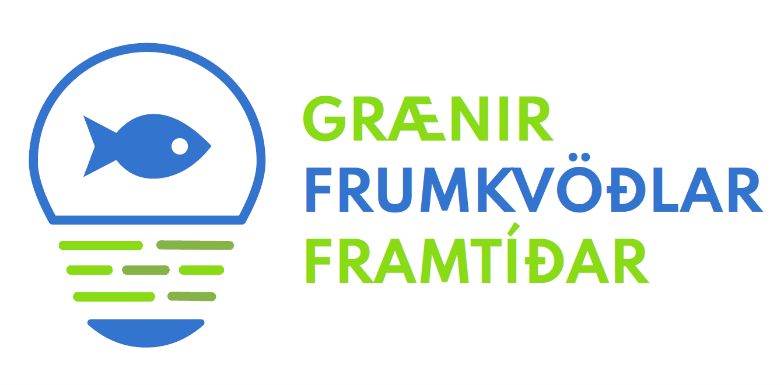
Tomorrow, March 22, the first MAKEathon of the Green Entrepreneurs of the Future (GFF) project out of three, will take place at Árskóli in Sauðárkrókur. The other two MAKEathon will take place before Easter at Bolungarvík Primary School and Nesskóli in Neskaupstaður. The MAKEathon project is an innovation competition that lasts for two days
In this first MAKEathoni, 31 students in the ninth grade participate. They work together in teams competing to present a solution to the challenge:
How can we reduce the use of plastic when packing fish and shrimp?
They try to create a kind of prototype, among other things in collaboration with FabLab Íslands 'workshop in each place, in addition to which Matís' staff will be on site to assist.
Students saw the challenge when they received visits from the fisheries companies Dögun and FISK Seafood and were educated about their activities, which was one part of the GFF project. In addition, they gained insight into possible challenges in terms of the effects of climate change on the ocean and their immediate environment, which was part of one of the project's workshops, Studio 4.
All GFF material will be made available after the project is completed.
The Green Entrepreneurs of the Future project started in schools in September 2021 and MAKEathonin is the last part of the project. The national competition between the three schools will take place in May and its results will be announced in the Innovation Week, on 20 May. The project is funded by the Climate Fund.
This winter, the television station N4 has recorded material for a television show about the project, and the filmmakers will be from them on site. The show will be shown on the television station this autumn, where the project will be presented in its entirety.
For more information, please contact the project manager Justine Vanhalst via email Justine@matis.is. Schools that want to participate in the future are especially encouraged to get in touch.
Here you can follow the progress of the project:
- Website of the project
- The project's Instagram page
- #Graenirfromkvodlar
This report presents the results of an experiment performed by Matis ohf. for Roquette.
The trial objective was to compare the effect of different inclusion levels of corn gluten meal and Zearalenone on growth of Atlantic salmon (Salmo salar) and histopathology variances of the intestinal tissue and liver tissue.
View report
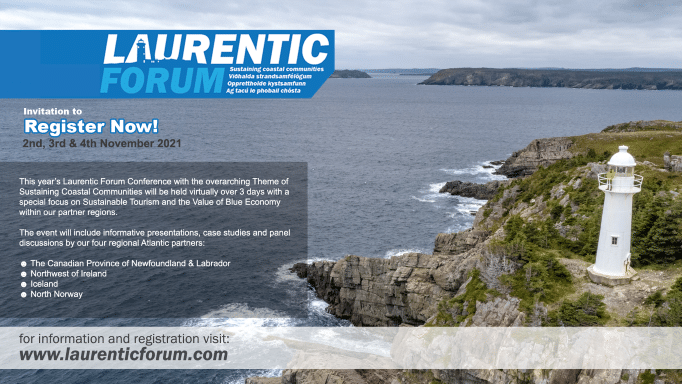
From 2.-4. The LAURENTIC FORUM online conference will take place in November, and this is the thirteenth time the conference has been held. The aim of the conference is to discuss opportunities and challenges for coastal communities in the Arctic. The program is divided into two parts, ie. tourism (Nov 2) and fisheries (Nov 3 & 4).
The conference takes place online and interested parties can participate free of charge, but registration is required. website of the conference where you can also access the program.
The program is divided into five seminars and in each of them there are presentations from representatives of Iceland, Norway, Ireland and Newfoundland & Labrador. The seminars and speakers can be seen below.
Session 1: Sustainable Tourism: Looking Forward
- Minister Steve Crocker, Department of Tourism, Culture, Arts & Recreation, Newfoundland and Labrador
- Councilor Jack Murray, Mayor of Donegal
- Sigrid Engen, Researcher, Norwegian Institute for Nature Research
- Dale Jarvis, Executive Director of Heritage Newfoundland & Labrador
- Johann Vidar Ivarsson, Project Manager at the Icelandic Tourist Board
- Maurice Bergin Managing Director, GreenHospitality.ie (Ireland)
- Margaret Story, TIDE Project Officer
Session 2: The value of the Blue Economy
- Andrew Ward, Joint CEO of Inishowen Development Partnership
- Charlie McConalogue, Irish Minister for Agriculture, Food and the Marine
- Sunniva Løviknes, Troms and Finnmark County
- Bente Olsen Husby, West - Finnmark Council
- Iris Petten President, Port de Grave Historical Society, NL
- Karl Bonar, Manager, Donegal Blue Economy Marine Cluster
- Sveinn Agnarsson, Professor, University of Iceland School of Business
Session 3: The Engine That Does Not Stop: Changing Course Through Innovation & Technology
- Paul Winger Director, Center for Sustainable Aquatic Resources, Fisheries and Marine Institute of Memorial University
- Þór Sigfusson, Founder and Chairman of the Icelandic Ocean Cluster
- Joanne Gaffney Aquaculture Technical Manager, BIM
- Pål Arne Bjørn, IMR and Jo Inge Hesjevik Fisherman and Regional Political Representative
Session 4: The New Frontier: Sustainable Wealth & Health Through Blue Bioeconomy
- Nils Kristian Sorkem Nilsen, Director Arctic, regional policy, state aid, North Norway EU Office, Brussels
- Jón Þrándur Stefánsson, Ministry of Industries and Innovation (Department of fisheries), Iceland
- Jón Garðar Steingrímsson,Chief Operating Officer, Genis
- Line Kjelstrup, Cluster Manager, BIOTEC NORTH
- Jason Whooley, Chief Executive Officer, Bio-Marine Ingredients Ireland Ltd.
- Heather Burke Director, Center for Aquaculture and Seafood Development, Fisheries and Marine Institute of Memorial University.
Session 5: The Whale in the Room: Climate Change
- Jónas R. Viðarsson, Director of Division of Value Creation, Matís, Iceland
- Glenn Nolan, Head of Oceanographic and Climate Services at the Marine Institute, Galway
- Darrell Mullowney, Shellfish Research Scientist, Fisheries & Oceans, Canada.
- Ragnhildur Friðriksdóttir, Matís, Iceland
- Stein Arne Rånes Senior Policy Advisor for Troms and Finnmark County Council

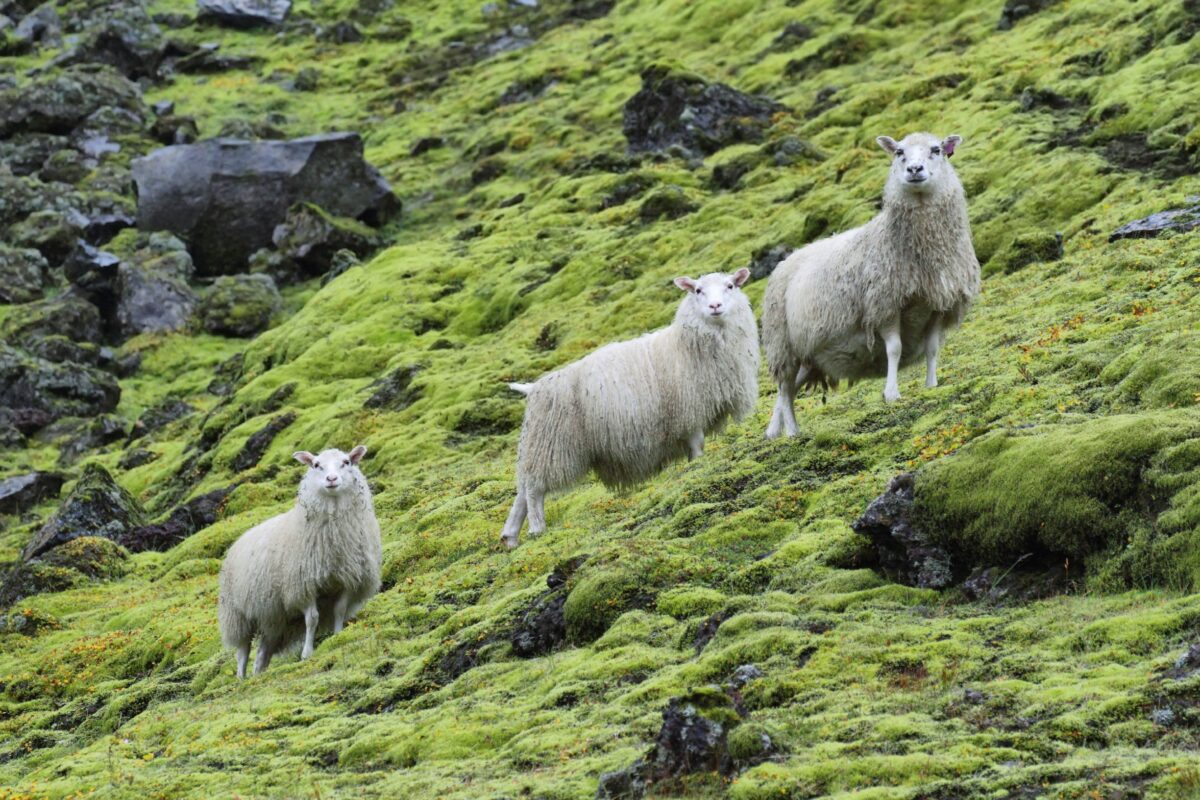
In the last issue of Bændablaðið, an interview was published with Sæmundur Sveinsson, director of genetic research at Matís, and the topic was a research project he is currently working on in order to protect genetic variability in sheep against rubella.
Bændablaðið's article "Project on the search for protective genetic mutations in sheep against rubella" discussed Matís' project, which is funded by the Professional Council for Sheep Breeding and is carried out in collaboration with Keldur. The project is about refining scabies gene analyzes in Iceland by adding genotypic analyzes of the protective variability that is best known for providing great protection against scrapie in sheep. This is the second of two projects in Iceland today that focus on scrapie analysis.
In the interview, Sæmundur discusses the possibilities inherent in these improvements, but emphasizes that this is not a quick fix, but that the project will possibly provide tools that can be used in the fight against riding in the long run.
The news can be read in its entirety in the last issue of Bændablaðið or on the website bbl.is here: Project on the search for protective genetic mutations in sheep against rubella
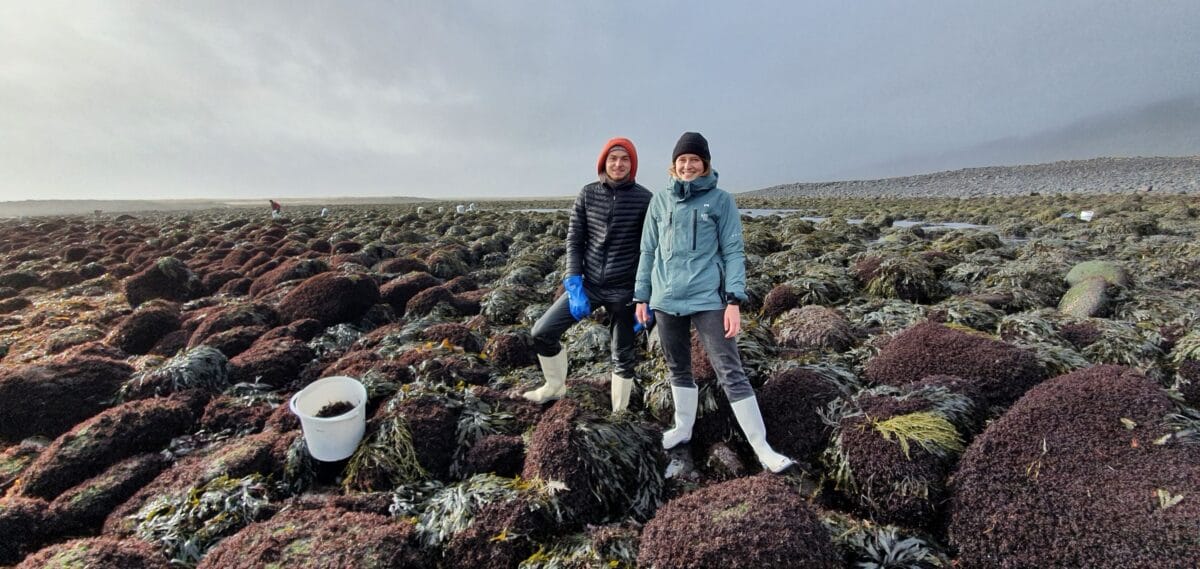
The projects undertaken by apprentices and specialists at Matís are varied. Last week, Þóra Valsdóttir, project manager, went on a beach trip with interns Romain Canuel and Sabrina Rechtsteiner.
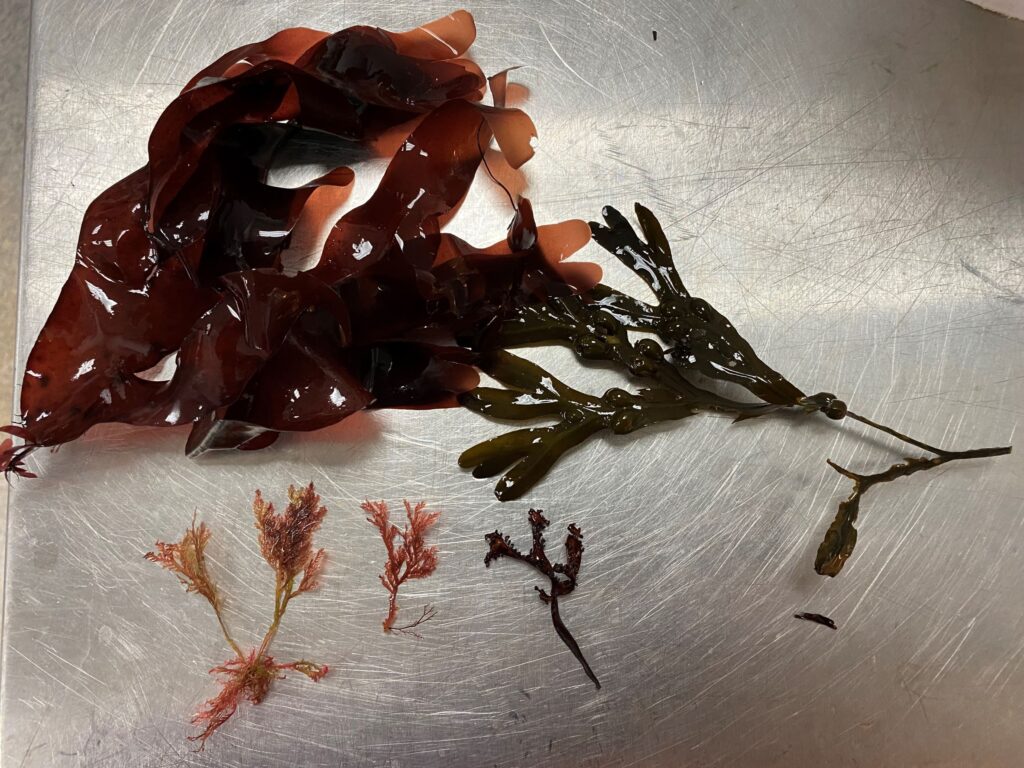
The reason for going on a beach trip was that in the project MINERVA came to sample collection. The aim of the MINERVA project is to make untapped life resources, in this case biomass of algae growing throughout Europe, higher under the head. This will be done by improving processing methods and thus contributing to less waste and the development of new, valuable high-quality products from the raw material.
The sampling went well, as a rich garden was grazed, as can be seen in the attached pictures.
More information about the project can be found on its project page here: MINERVA
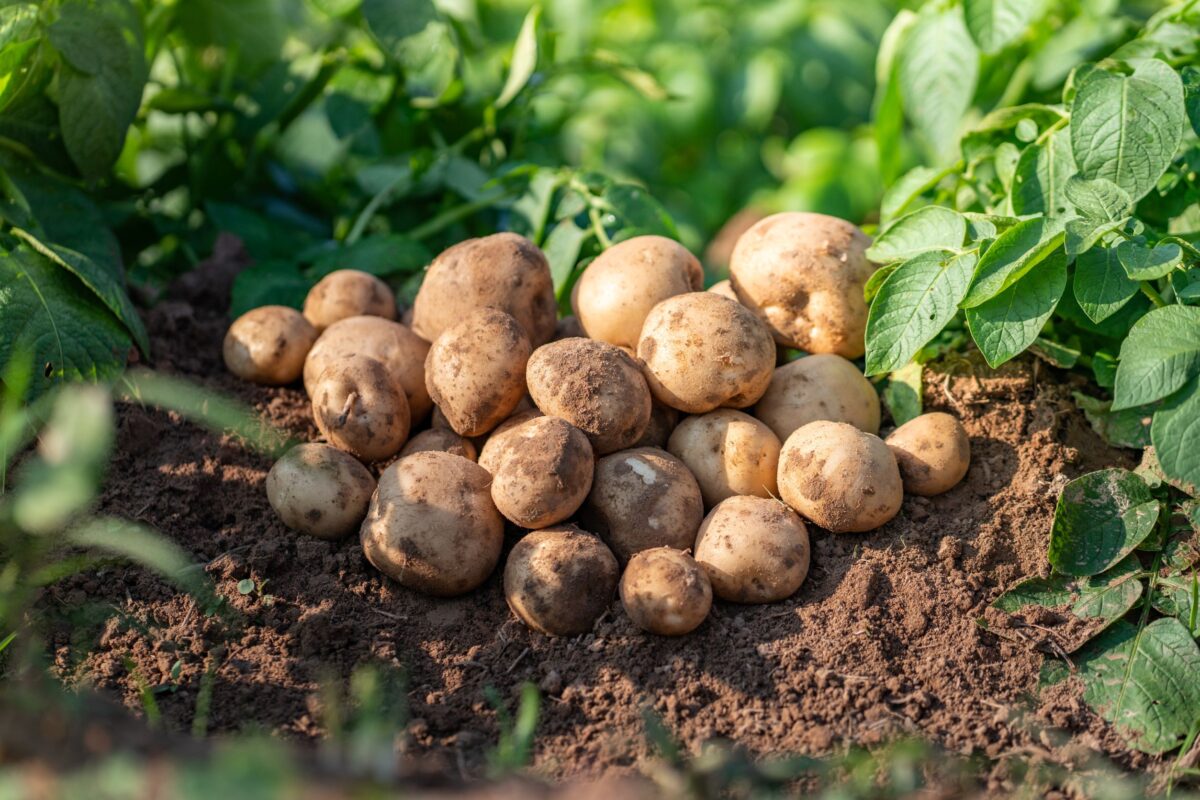
At Matís, various researches are underway on vegetables for a grant from the Food Fund. The research aims to increase the quality and shelf life of vegetables but also to reduce waste in the value chain from harvest to consumer and find new ways to increase the value of by-products in the vegetable sector.
Recently completed a project that started in 2020 and dealt with the antioxidant activity and quality of vegetables. Antioxidant activity refers to the activity of antioxidants which are among the important substances in vegetables. Antioxidants are substances that provide the body with protection against the harmful effects of substances that promote oxidation. The health benefits have been attributed to the consumption of antioxidant vegetables.
Antioxidant activity was found in all vegetable samples but varied by species. Significant antioxidant activity in potatoes came as a surprise as antioxidants are often associated with colorful vegetables.
Cauliflower and broccoli, along with potatoes, were among the vegetables that scored the highest for antioxidant activity.
The healthiness of potatoes may be underestimated, but they are often not included in the healthiest vegetables. Potatoes contain important nutrients such as vitamins and a considerable amount of starch, which makes potatoes more energetic than most other vegetables. The results of the project have been published and can be accessed here: https://matis.is/skyrsla/gaedi-og-andoxunarvirkni-graenmetis-a-markadi-2020-21/ . New results can be expected for vegetables in the coming months, including potatoes.
Are you interested in research and innovation in the vegetable sector? Watch Matís' focus meeting on the value chain of vegetables here: Value chain of vegetables.
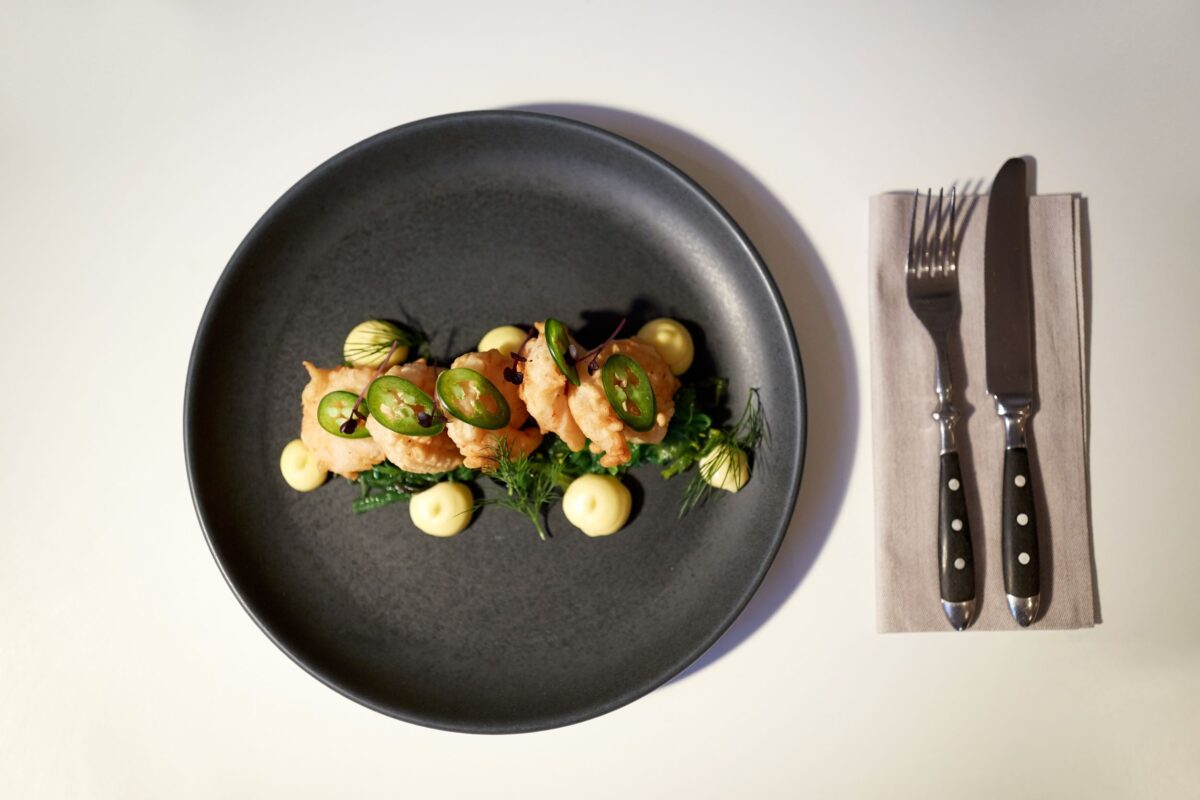
The electronic conference The Nordic Kitchen Manifesto: a catalyst for dialogue on a sustainable and healthy food culture for the future will take place on 27 September.
The conference aims to launch a debate on Nordic food culture and its various driving forces to promote a sustainable lifestyle. It's time to explore how the Nordic Kitchen Manifesto can be a forum for constructive dialogue between different sustainability perspectives on a fair food system in the Nordic countries.
The conference will be held in English and Swedish through Zoom on September 27, 2021 from 9: 00-12: 00 Icelandic time.
Registration is open until September 24. Click here to register
- Here you will find more information about the conference and its agenda.
- Here you will find more information about Nordic Kitchen Manifesto
- Here you will find information about New Nordic Food program.
Schedule for The Nordic Kitchen Manifesto September 27, 2021:
| 12:00 | Opening of webinar - setting the Nordic table Bettina C. Lindfors, Moderator, Project Manager, New Nordic Food |
| 12:05 | Why does sustainable food policy in a Nordic context matter? Jari Leppä, Minister of Agriculture and Forestry of Finland |
| 12:15 | Sustainability at the core of Nordic cooperation - how to engage in change? Thomas Blomqvist, Minister for Nordic cooperation and equality |
| 12:25 | New Nordic Kitchen manifesto strengthens the Nordic as a sustainable gastronomic region - voices from the initiators of the manifesto with Chef Leif Sörensen, Faroe Islands & representatives of the younger generations of chefs and other key actors in the food systems about drivers for the future |
| Meeting the challenges and possibilities for Nordic collaboration within sustainability perspectives of food systems - inspirational talks: | |
| 12:45 | Sustainability perspective from Greenland by Anne Nivíka Grødem, Deputy Manager, Sermersooq Business and Cluster Manager & NERISA - an Arctic Food Cluster |
| 12:55 | Sustainability perspective from Iceland by Ásta Kristín Sigurjónsdóttir, Manager, Icelandic Tourism Cluster |
| 13:10 | Sustainability perspective from Denmark by Magnus Nilsson, Director, MAD Academy |
| 13:25 | Sustainability perspective from Sweden by Elin Aronsson-Beis, Sustainability Consultant in food business, FoodLoopz & Paul Svensson, Chef, Developer of restaurant business |
| 13:35 | Sustainability perspective from Finland Climate Food Program, Hanna Mattila, Ministerial Adviser, Ministry of Agriculture and Forestry & Robert Jordas, vertical gardener, Lilla Robbes Trädgård |
| 13:50 | Sustainability perspective from Norway (tbc) |
| 14:05 | Sustainability perspective from Faroe Islands by Elisabeth Skarðhamar Olsen, Lecturer, University of Faroe Islands |
| 14:20 | Sustainability perspective from Åland Islands by Gustav Eriksson, Chef, Silverskär and Johanna Dahlgren, food & beverage entrepreneur, Pub Stallhagen, Chair of Artisan food entrepreneurs in Åland Islands |
| 14:35 | Wrap up of inspirational talks in discussion with representatives of the younger generation of chefs and other key actors in food systems supported with a policy comment by Senior Adviser Katja Svensson, Nordic Council of Ministers |
| 14:45 | Process of creating a constructive dialogue tool - common steps forward |
| 15:00 | End of webinar |
The event's project manager, Bettina C. Lindfors, provides further information about the electronic conference and warmly welcomes everyone.
Bettina C. Lindfors
Project Manager, New Nordic Food
Nordic Council of Ministers c / o Ministry of Agriculture and Forestry of Finland
+358 40 920 9810
bettina.c.lindfors@gmail.com
Twitter: @BettinaLindfors
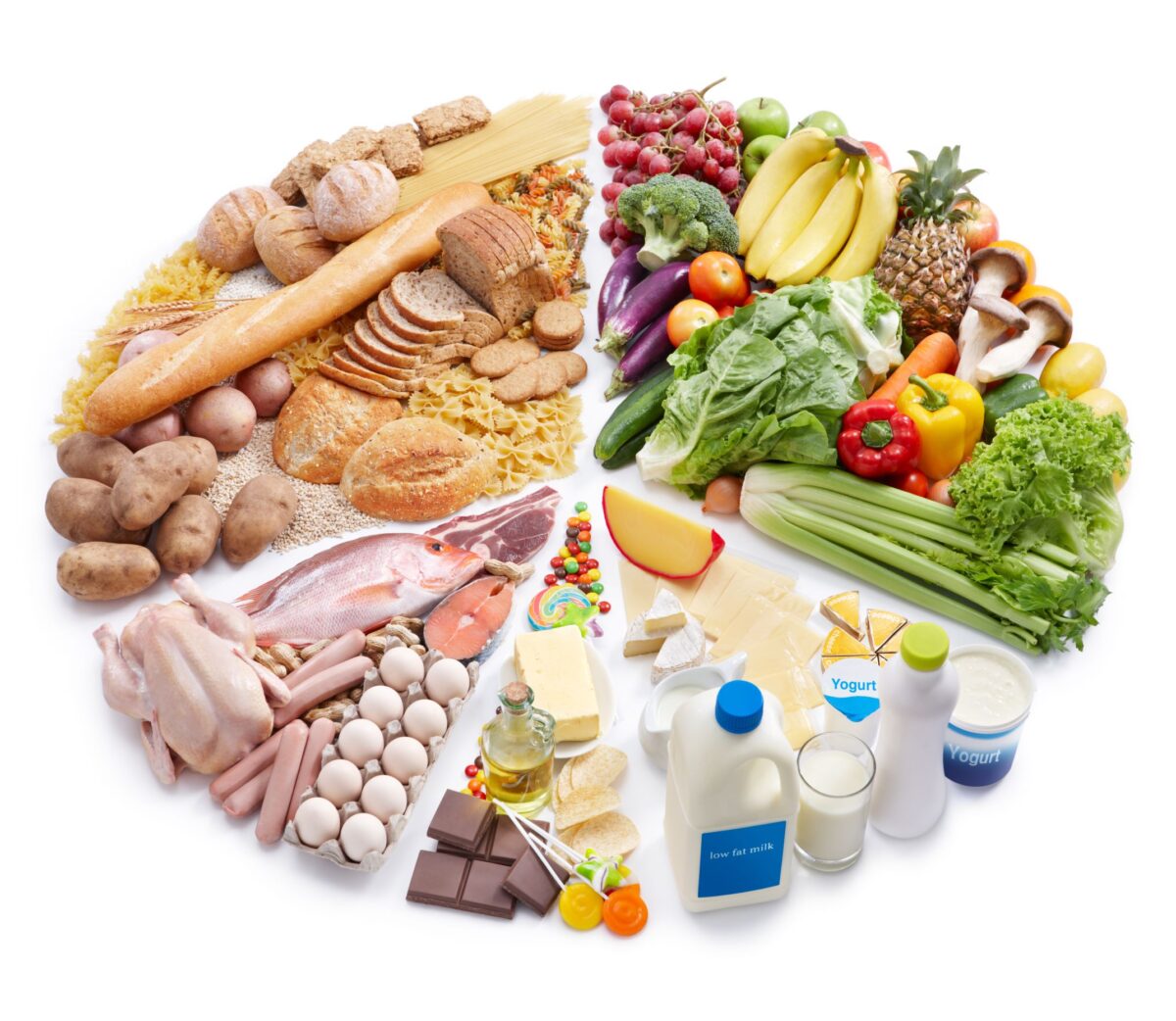
Matís, the University of Iceland and the Institute of Animal Reproduction and Food Research The Polish Academy of Sciences in Olsztyn is currently organizing the course School on adding value to food side streams 2021 which will take place in Iceland 7.-17. next October.
A search has begun for talented students and young scientists who want to increase their knowledge of innovation and strengthen their skills in management by solving various tasks.
The objectives of the course include:
- Raising awareness of the social and environmental responsibility of food producers and of the opportunities that exist to improve the utilization of by-products in food production.
- To build a platform where students and young professionals with diverse backgrounds can exchange ideas and tackle the opportunities and challenges that exist when it comes to adding value to by-products in food production.
- To promote overall concept work and product development.
- To strengthen, expand and strengthen the network of young entrepreneurs.
The course will be taught in English and is free of charge for students.
Here you can see the program of the course
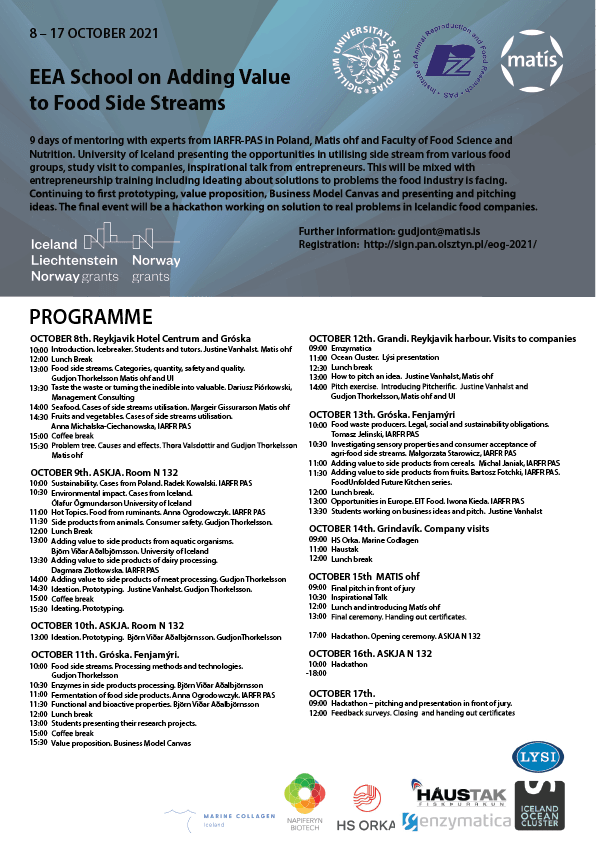
An introductory video about the course is in the player here:
More information about this great opportunity can be found here:
Registration takes place here:
The application deadline is 30 September


Matís holds a special course website where a variety of educational material is available. This is a website that hosts 7 courses, but each one addresses certain aspects that are important for small food producers to get acquainted with. The content of the courses is presented in a lively and practical way and can therefore also be useful for food production enthusiasts or curious entrepreneurs.
Small-scale food production in Iceland is, however, considerable and will probably increase in the coming years. Licensors and regulators demand to a much greater extent that manufacturers have the professional knowledge and experience to be able to produce safe and good products. The course material and course instructions allow those who intend to start small-scale food production to acquire knowledge that is useful, for example, in all kinds of raw material handling, storage and labeling of food, application for an operating license, internal control and the preparation of a quality manual.
The topics of the courses are as follows:
- Licensing, quality manual, internal control and establishment of companies - Instructions for starting small-scale food production, distribution and sale.
- Microorganisms on meat - Study materials and guidelines aimed at explaining the importance of proper processing and handling of food so that it does not cause harm.
- Slaughter and meat eating - The meat assessment, ie. The classification of carcasses by sex, age, body fat and fat, plays an important role as a basis for pricing and trade in meat and for information for animal husbandry.
- Salting and smoking - Taste properties and technical purpose of salting and smoking foods.
- Food packaging labeling and packaging - All foodstuffs intended for end-users or commercial kitchens must be accompanied by food information in accordance with regulations. It can also be good to pack products in packaging and then it is important to know how to work.
- Raw processing and sausage making - Educational materials on processed meat products, such as food that has been changed from its natural state in some way, mainly for safety reasons, to improve the taste quality or increase the comfort of consumption.
- Sawing, deboning and marinating - Material on different divisions of an entire carcass into individual parts as well as marinating and the science behind it.
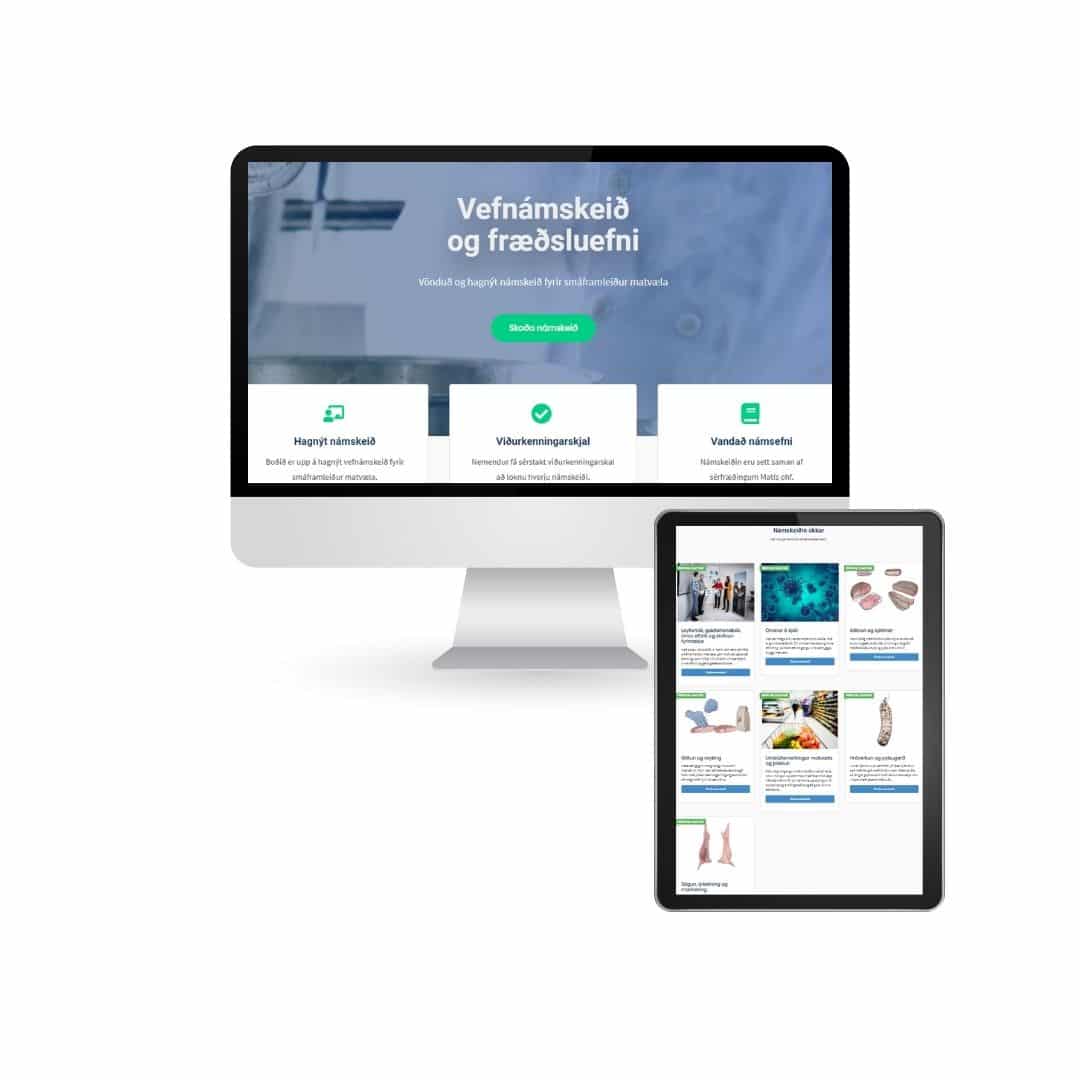
The educational material in the courses is compiled from various data, such as the laws and regulations that deal with food, from previous research and the study and promotional material that has been prepared at Matís and the Food Administration.
When purchasing a course, the study material opens and the buyer has access to it for 30 days.
Matís is the largest research company in the country in the field of food research and Matís' staff has many years of experience in food research. Great emphasis is placed on disseminating knowledge to the food industry in Iceland and web courses are one way to do this.

